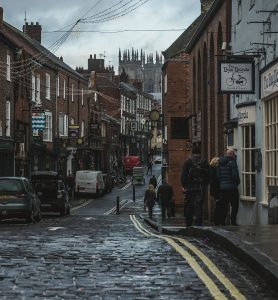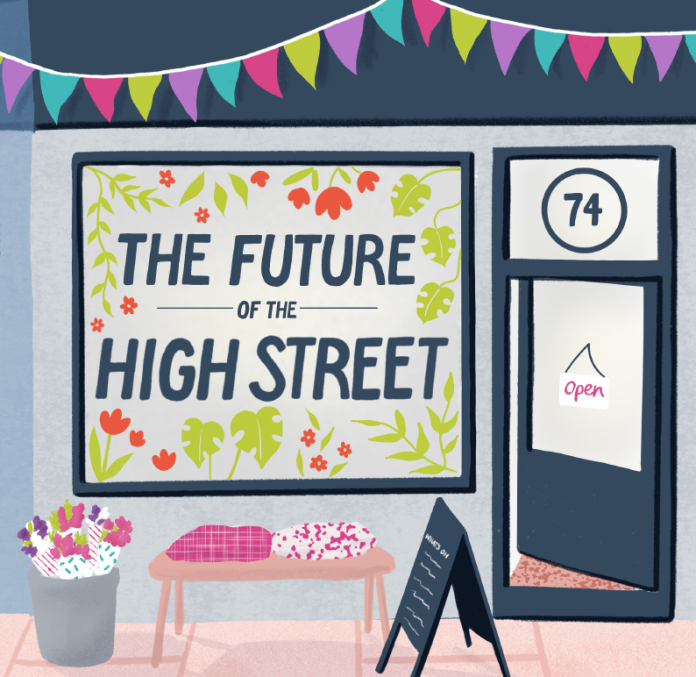The UK’s biggest business group has unveiled a package of new measures to help transform life on our ever-evolving high streets for the millions of small firms based on them.
Supporting pop-ups and temporary use initiatives for new businesses, creating mobile phone-based loyalty programmes, and showcasing local high streets in major tourism campaigns are some of the recommendations set out to revive the UK’s village, town and city centres, in a landmark new report by the Federation of Small Businesses (FSB).
The Future of the High Street report, published this week, builds up a picture of life for small firms in and around the high street and sets out a plan to help transform them into places that meet future needs and support the next generation of entrepreneurs, which is essential for a thriving economy.
FSB is calling for a specialised fund to be created to support pop-ups, markets, and temporary use initiatives for first-time businesses to encourage new ventures and help them set up on the high street. With more than a third (39%) of high street small businesses saying the availability of affordable commercial space is important for the future of an area, ensuring temporary spaces are available will not only fill vacant sites but also provide opportunities for small firms eager to launch in a physical premises.
The report, which features in-depth analysis following a large-scale survey of small businesses, also suggests a specialised fund to support a mobile phone-based loyalty programme for high street firms, and launching community-specific online marketplaces to showcase local shops and services.
To bring in visitors and increase footfall, local high streets should be featured in domestic and international tourism campaigns. FSB is encouraging tourism groups like VisitBritain, VisitEngland and Local Visitor Economy Partnerships to showcase the unique character and offerings of local high streets across the UK in promotions and coordination of campaigns.
The research also found:
- Plummeting consumer spending (70%), falling footfall (47%) and crime or anti-social behaviour (47%) are the biggest risks to high streets according to the small firms based on them.
- Over half of local businesses (57%) say a diverse range of independent businesses is one of the most important features for the long-term sustainability and future of their local high street.
- Good transport links are also key for the future of the high street, according to almost half (43%) of small businesses based on them.
- Around half (49%) of high street small businesses say parking facilities are managed poorly on their local high street.
- Since the beginning of the Covid-19 pandemic, most local businesses saw a range of closures on their local high street, including: retail stores (72%), hospitality (69%), banks (58%), post offices (28%), and entertainment venues (20%).
Tina McKenzie, Policy and Advocacy Chair at the Federation of Small Businesses (FSB), said: “Our small businesses are an integral part of the high street and will be central in leading the transformation of their local economies. By providing the infrastructure, flexibility and digital connectivity that modern businesses demand, high streets will have the resources available to become resilient, dynamic hubs ready for the future.
“As well as core recommendations targeting fundamental issues for small firms on the high street, including business rates, transport and parking, this report also lays out innovative asks to ensure these businesses can survive into the future and ultimately help revive our town centres.
 “High streets must be helped to evolve to keep pace with changes in consumer behaviour as well as how small firms want to work. One example of this is introducing loyalty schemes for high streets to encourage local businesses to collaborate and incentivise consumers to shop, eat, and drink locally.
“High streets must be helped to evolve to keep pace with changes in consumer behaviour as well as how small firms want to work. One example of this is introducing loyalty schemes for high streets to encourage local businesses to collaborate and incentivise consumers to shop, eat, and drink locally.
“It’s been exciting to hear from many online small firms that want to take steps to open up in a bricks and mortar premises on the high street. These businesses need support to make that change – and should be given the flexibility to access pop-up and temporary units. Before the General Election, we were pleased to see Labour’s emphasis on improving life on the high street for small firms. It’s now time for the new Government as well as local authorities to put these plans into action and ensure that small firms on our high streets are fully supported.”
According to the report’s other findings, empty units are a major blight on shopping streets across the UK, with more than two thirds (69%) of local businesses reporting them on their nearby high street. FSB is asking for a band of on-site high street chiefs responsible for the growth and wellbeing of high streets across the country, creating promotion plans and monitoring vacant units within their area.
The research also highlights the need for well-maintained and accessible modern public toilets and family-friendly services like creche facilities, encouraging visitors to stay longer, upping footfall and supporting the local economy.
Business rates remain a huge burden on high street small businesses, with the current Small Business Rate Relief (SBRR) a key part of their survival. Almost half (49%) of high street small businesses say they would not survive without SBRR. The research also found that more than half (54%) of high street small businesses would invest in or grow their businesses if the SBRR threshold was increased from £12,000 of rateable value to £25,000. FSB believes this increase would be a crucial step in allowing small firms to further foster growth.
The report calls for a high street hop scheme providing free bus fares on key routes during peak shopping days to help increase footfall and support local businesses. Offering free parking on at least two Saturdays, plus two additional days a month, would increase footfall and support local businesses by making high streets more accessible.


